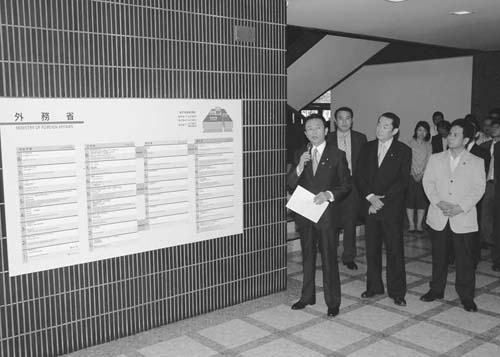Japan's Official Development Assistance White Paper 2006
Main Text > Part I JAPAN'S OFFICIAL DEVELOPMENT ASSISTANCE FOR WORLD PEACE AND PROSPERITY > Chapter 3 Aiming for Strategic, Flexible, and Effective ODA > Section 1. Implementing More Strategic and Flexible ODA
Section 1. Implementing More Strategic and Flexible ODA
In the past Japan has taken various steps to improve its methods of policy formulation, planning, and implementation of ODA. Recently, however, a particular emphasis has been placed on the concordance with diplomatic objectives, strengthening coordination between the various methods of assistance and information gathering. At the same time, special attention was given to the comprehensive study and review performed by the Government covering all phases from the framework of ODA policy planning and policy making to the ideal system of implementing ODA.
The ministry of Foreign Affairs conducted the review, taking into account following three points, with the recommendations by the Study Group on Overseas Economic Cooperation which was organized by the Chief Cabinet Secretary since December 2005. The first was to thoroughly examine the organization from the basic functions, including the restructuring, so as to enhance the capacity to formulate the ODA policy. The second was implementing ODA through closer coordination between the various types of assistance schemes such as yen loans, grant aid, and technical cooperation, and with stronger collaboration with international organizations and private sector financing. The third was incorporating into global issues the viewpoints, such as human security that Japan has hitherto advocated, and translating them into action.
The following is the highlights of the ongoing review of Japanese ODA policy.
In February 2006 a report was prepared by the Study Group on Overseas Economic Cooperation. The recommendations of the report covered the policy making system within the government concerning internal government systems and implementing agencies with a view to extending strategic overseas economic cooperation effectively based on Japan's national interests. The report first pointed out that overseas economic cooperation centered on ODA contributed to Japan's "enlightened national interest"25 and that Japan should make clear that its overseas economic cooperation is to build an international community made up of peaceful and prosperous states under the basic principles of freedom, democracy, and the rule of law. It also pointed out that the existing system does not function adequately in this regard and that the system for making strategic decisions and for accountability was not clear. It therefore recommended the establishment of the Overseas Economic Cooperation Council for implementing overseas economic cooperation strategically. In addition, because of the need for better coordination between yen loans, technical cooperation, and grant aid, the report requested an integration of JICA and the yen loan branch of JBIC, with JICA handling three schemes of assistance (yen loan, technical cooperation, and grant aid) in a comprehensive manner.
Based on the recommendations of this report, the Government established in April 2006 the Overseas Economic Cooperation Council consisting of the Prime Minister and a small number of Cabinet members as a system for flexibly and substantially discussing important matters concerning Japan's overseas economic cooperation. The first meeting of the Council was held in May, and as of September 2006 the Council met three times. MOFA continues to play the core role in concrete policy formulation, policy planning, and coordination of ODA under the basic strategy of overseas economic cooperation deliberated by the Overseas Economic Cooperation Council, in closer coordination with ministries and agencies concerned (see Part II, Chapter 2, Section 5 for details).
In August 2006 the International Cooperation Bureau was newly established in MOFA. In order to implement assistance in concordance with diplomatic policy, this bureau is expected to use more effectively the various schemes of bilateral assistance—yen loans, grant aid, and technical cooperation—to identify priority issues by geographical region and development sector. It is also requested to undertake policy formulation, policy planning, and coordination for implementing bilateral assistance and assistance through international organizations in a more closely coordinated fashion. As these reforms are executed, it is important to accurately address the common issues shared by the international community, such as the environmental issues and African development, as well as to provide support for reconstruction and nation building in Iraq and Afghanistan. It is also important to accurately address the issues involved in fulfilling the mission required for ODA under the new international economic environment such as securing resources and energy and developing a proper environment for trade and investment. Under the Overseas Economic Cooperation Council the formulation and planning of ODA policy will be carried out strategically and effectively, with the International Cooperation Bureau of MOFA playing a core role in close collaboration with the related ministries and implementing agencies.
It is extremely significant that bilateral assistance and assistance through international organizations be coordinated so as to implement efficient assistance, given the fact that bilateral assistance and multilateral assistance are mutually complementary and synergistic. This coordination is especially effective when swift action by the international community as a whole is required to address poverty, peacebuilding, environmental issues, infectious diseases, gender disparities, and disasters. More thorough consideration is expected to be given to this point in the present organizational reforms.
With respect to the implementing agencies, it has been decided that JICA will essentially have overall responsibility for each of the three schemes of assistance in order to further strengthen coordination between yen loans, technical cooperation, and grant aid. At present, preparatory work is underway with a view to integration in October 2008 (see Part II, Chapter 2, Section 5 for details).

Inauguration ceremony of the Ministry of Foreign Affairs' new organizations


 Next Page
Next Page